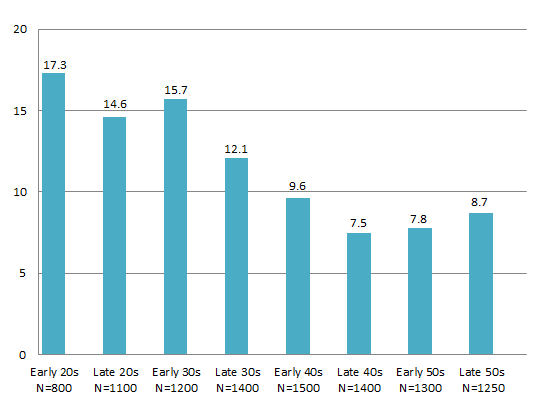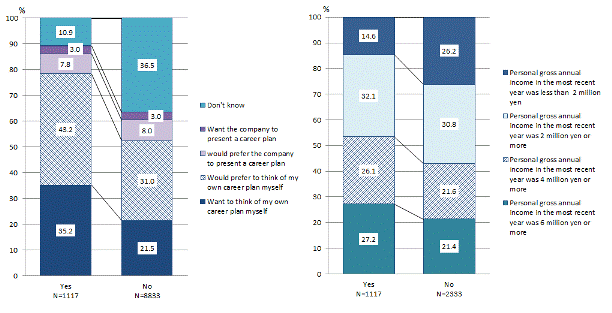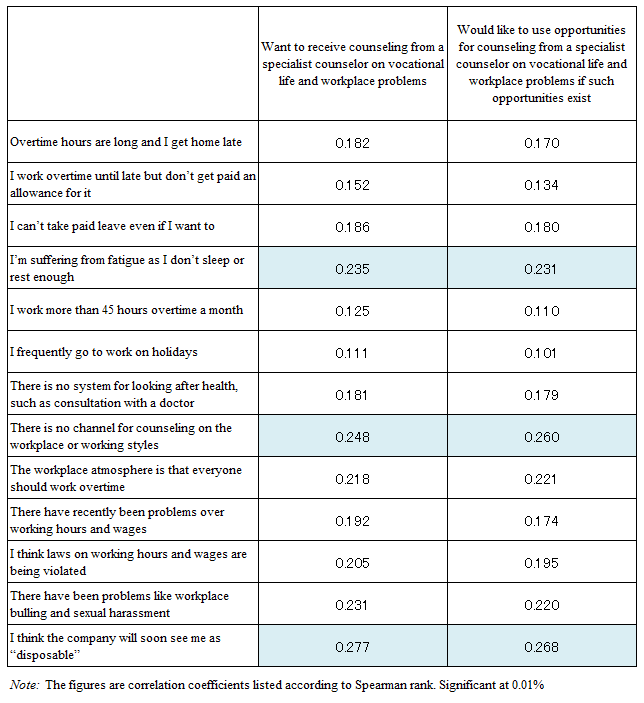JILPT Research Report No.191
Current Status, Effects and Latent Needs of Career Counseling:
From Survey Results including Responses from 1,117 Persons with Experience of Counseling
March 24, 2017
Summary
Research Objective
To promote career counseling measures effectively, it is essential that we have a detailed understanding of the realities and effects of career counseling, based on workers’ attributes and industries. To this end, the author conducted a survey with persons who had prior experience of career counseling (or individual career guidance of a similar kind, all referred to below as “career counseling”) in the past, then quantified and analyzed the results. At the same time, the author also carried out a survey on the latent needs of persons without such experience of career counseling. The purpose of conducting these surveys was to provide data that could be of benefit to career counseling measures as a whole in future labor administration.
Research Method
In this research, a broad-ranging survey of persons with prior experience of career counseling was conducted and their responses were solicited. Respondents were asked detailed questions about when they had experienced counseling, in what kind of situation, from whom, and on what kind of topic, how the problem was solved or changed as a result, and how they felt about the process. After this, the effects of experiencing career counseling were to be shown clearly, by contrasting them with cases of persons with no such experience. At the same time, knowledge contributing to future career counseling measures was to be obtained by discovering the latent need for career counseling on the part of those without experience of it. In the survey, sixteen cells were set (early 20s, late 20s, early 30s, late 30s, early 40s, late 40s, early 50s, late 50s, each divided into male and female), 400-900 subjects were allocated to each cell, and responses were sought from a total of around 9,950 subjects. Responses were ultimately collected from 1,117 subjects with experience of career counseling and 8,833 subjects with no such experience.
Main Findings
- Of 9,950 respondents in all, 1,117 or 11.2% had prior experience of career counseling. On examining the correlation with personal attributes, those with experience of career counseling were (1) basically more numerous in younger age groups, (2) more numerous among those who could be regarded as white-collar university graduates continuously employed for long periods in large corporations, and (3) more numerous among respondents with a strong awareness of their own vocation and career (e.g. awareness of their current level of satisfaction, their own careers, career plans and vocational ability) (Figure 1).
- The impact of past career counseling experience on the respondent’s current situation was examined. As a result, those with experience of career counseling (1) often had experience of changing jobs and (2) were in generally good situations in terms of their working style. Specifically, they currently worked for employers with a large number of employees, served as company officers and were high earners. Moreover, (3) they generally had a strong career awareness. Specifically, many of them were satisfied with their current lives, had personally planned lifelong career plans in readiness for their future jobs and careers, had vocational skills that would also be relevant elsewhere, and took it upon themselves to develop those skills. Strictly speaking, however, it would be difficult to posit a simple causative relationship between experience of career counseling and the respondent’s current situation, as there was thought to be some kind of cyclical causal relationship between interest in career and experience of receiving career counseling (Figure 2).
- The three most commonly cited topics of career counseling were “changing jobs,” “job content” and “one’s own aptitude or non-aptitude for the job.” The topic of counseling was closely connected with the counseling environment and institution. As general trends, counseling within companies were often concerned with “boosting motivation,” “internal transfers, temporary transfer, or moving out to another company” and “human relationships inside and outside the workplace,” while outside the company the most common topic was “changing jobs.” In schools, the most common topics were “finding employment” and “further education or study abroad,” while in public institutions “counseling on finding employment after graduating from school” was most common. A correlation was also seen between the counseling topic and the person responsible for counseling. The topic most commonly involving career counseling specialists was “changing jobs”; for specialists in other types of counseling, “human relations” and “psychological disorders” were most common; and for other related personnel “finding employment while still a student” was most common.
- Counseling environment and institutions could broadly be organized into three types, namely “inside the company,” “outside the company” and “public institutions.” Specifically, (i) for respondents working in large corporations, regular employees, workers with more years of continuous employment, company officers and high earners, the counseling environment and institution were most commonly “inside the company.” (ii) For respondents working in small and medium enterprises, non-regular employees, workers with fewer years of continuous employment, non-officers and low earners, the counseling environment and institution were most often “public institutions.” (iii) For respondents who had an interest in planning their careers and improving their abilities independently, and who were disposed toward changing jobs and independence, the counseling environment and institution were often “Outside the company.”
- On the effects of career counseling, (1) those with experience of career counseling generally found that their problem was solved by career counseling, their careers or vocational lives had changed, they were glad to have asked for counseling, and it had been useful. (2) When asked what exactly had changed as a result of career counseling, the top three answers were “The future is clear now,” “I found a job” and “My job changed, or I changed jobs.” (3) Generally, those who received counseling from “Career counseling experts” most commonly responded that “The problem was solved,” “I solved it myself with the counselor’s help” and “My career and vocational life changed.” Other answers receiving a high response rate were that wages had “increased” and working hours had “decreased.” Besides these, many respondents replied that they were “very glad” to have received counseling, and that it was “very useful.”
- On studying the need for counseling among those without experience of career counseling, it was found that (i) the need for counseling varied greatly depending on age. Needs were high among respondents between their 20s and early 30s; for example, 29.3% of those in the second half of their 20s responded that they would like to receive counseling. (ii) The specific topic targeted for counseling also differed according to age. Although the topics for counseling were generally numerous among those in their 20s and 30s, needs related to finding employment, advancing to further education or studying overseas, human relations with coworkers and superiors in the workplace, and psychological illness were large among those in their 20s. By contrast, those in their 30s had greater needs for vocational ability development, vocational life design, promotions and other career-related counseling. (iii) Long working hours were also closely related to counseling needs. Among others, it was suggested that a greater concern should be placed on the connection between problems of working styles (as symbolized by long working hours) and career counseling in future (Table 1).
Figure 1. Ratios of respondents with experience of career counseling by age

Figure 2. Individual annual incomes and career awareness by experience of career counseling

Table 1. Correlation coefficient between questions on working style and counseling needs, etc.

Policy Implications
- Experience of career counseling was mainly common among those in their 20s to early 30s, and the topic of counseling received by them was exclusively about changing jobs. When studying career counseling in future, greater emphasis will need to be placed on changing jobs by young workers as the specific user group profile.
- Those with experience of career counseling tended to have been promoted, to be high earners, and to have generally strong career awareness. However, these are very likely to have been endowed with good qualities and to have had strong career awareness in the first place; one could see it as a positive cycle, whereby this kind of target group is well-disposed toward career counseling, causing it to have an even better impact in terms of their careers. For those who are not inside this kind of cycle, on the other hand, career formation support measures including career counseling could provide opportunities for creating a positive cycle in career formation. As such, career counseling and other aspects of environmental development need to be enhanced still further.
- When respondents with experience of counseling on careers and occupations were asked about the content of that counseling, many responded with “Counseling on changing jobs by an external career counselor at around age 30.” The content of the free descriptions suggest that not all of them do actually change jobs, but that some of them sought advice on changing jobs as a hypothetical possibility. Until now, however, there has not been sufficient awareness of policy intervention support in terms of career counseling measures for workers in this age group who seek to change jobs. In future, more thought will need to be given to ways and approaches of career counseling for “workers aged around 30 who wish to change their jobs.”
- Career counseling was generally felt to be effective for those who had actually experienced it. In particular, counseling can be evaluated as beneficial in relation to topics that are directly linked to occupations or careers, such as “finding employment,” “one’s own vocational aptitude or non-aptitude,” “acquiring qualifications,” “ability development,” “future career planning” and “career development.” Conversely, although human relations in the workplace and psychological illness or disorders can sometimes be included within the framework of counseling on vocations and careers, these are not being addressed sufficiently at present, and are therefore tasks for the future.
- In general, stronger effects are produced when counseling is received from career counseling experts. In the free descriptions, however, some respondents highlighted negative aspects regarding the inconsistency of counselors’ qualities and skills. Attention should therefore be paid to this, alongside the debate on improving the quality of career counselors.
- Among respondents with no experience of career counseling, there is a degree of counseling need among younger age groups, reaching about 30% for those in their late 20s. While counseling needs are basically high among young regular employees working in large corporations, they are even higher if these employees have problems with long working hours and other aspects of the working style, and are not treated appropriately by their companies, or there is no internal channel for counseling. In future, there should be greater concern over problems of working styles (as symbolized by long working hours) and the relationship with career counseling.
Policy Contribution
This research will contribute broadly to policies on career formation support and vocational ability development, with a main focus on career counseling measures.
Contents (available only in Japanese)
- JILPT Research Report No.191 Whole text (PDF:1.8MB)
If it takes too long to download the whole text, please access each file separately.
- Cover – Preface – Authors – Contents (PDF:567KB)
- Chapter 1: Background, purpose and method of this research (PDF:285KB)
- Chapter 2: Respondents with and without experience of career counseling (PDF:485KB)
- Chapter 3: How experience of career counseling impacts the present situation (PDF:1.8MB)
- Chapter 4: Current status of career counseling (1) – Content of counseling (PDF:841KB)
- Chapter 5: Current status of career counseling (2) – Counseling environment and institution, counselors, etc. (PDF:716KB)
- Chapter 6: Effects of career counseling (1) – Correlation between personal attributes and counseling content (PDF:552KB)
- Chapter 7: Effects of career counseling (2) – Correlation with counseling environment and institution, counselors, etc. (PDF:535KB)
- Chapter 8: on career counseling (PDF:646KB)
- Chapter 9: Counseling needs of those without experience of career counseling (PDF:551KB)
- Appendices (PDF:1.8MB)
Research Categories
Project Research “Survey Research on Lifelong Career Formation Support and Employment Promotion”
Subtheme: “Survey Research on Lifelong Career Formation Support”
Research Period
April 2016 – March 2017
Author
- Hideo SHIMOMURA
- Senior Researcher, Department of Career Guidance, JILPT
Catergory
Employment / Unemployment, Working conditions / Work environment, Human resources management / Vocational skills development
Related Research Results
- JILPT Research Report No.171 “In-house Career Counseling and its Characteristics in Japan: Results of free description in the questionnaire survey and interview survey” (2015)
- Research Material Series No.131 “Career Guidance Policy and its Practice in Europe (1): From Policy to Practice: A Systemic Change To Lifelong Guidance in Europe” (2014)
- JILPT Research Report No.149, “Study on Various Adult Career Guidance Needs and Desirable Guidance Services” (PDF:614KB) (2012)
- JILPT Research Report No.125, “Career Education during the School Years and Young Peoples’ Occupational Lives” (PDF:326KB) (2010)
JILPT Research Report at a Glance
| To view PDF files, you will need Adobe Acrobat Reader Software installed on your computer.The Adobe Acrobat Reader can be downloaded from this banner. |

